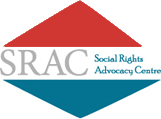Research
See SRAC Publications
See the Social Rights Community-University Research Alliance co-directed by SRAC.
See ESCR-Net's Case Law Database on Social Rights.
SRAC provides important research into social rights, based on a participatory research model and extensive consultation with affected communities. SRAC board members are active in SRAC research projects and oversee the direction of SRAC research. SRAC also relies on an extensive network of academic researchers and practitioners from across Canada and around the world for assistance and consultion in its research initiatives. Its innovative research model bridges academic and community and domestic and international research.
SRAC's research focuses on enhancing social rights accountability mechanisms at the local, provincial, national and international levels, providing research and organizational support for community organizations to develop capacity in social rights practice, and compiling and analysing emerging case law, including pleadings and strategic approaches used in this area. Through funding from the Social Sciences and Humanities Research Council - Community University Research Alliance (CURA), SRAC provides part-time funding for its Executive Director to co-direct the Social Rights Accountabilitiy Project. That research has been unanimously judged by a Mid-term Adjudication Committee for the Social Sciences and the Humanities Research Council as “among the best ones reviewed.” Many recent developments in the area of social rights countability , both in Canada and internationally, were supported by research and action initiated under the project. The project has been presented to international visitors as exemplary of the principles behind, and the effectiveness of, the CURA model.
Some of the research outcomes of the SRAP at www.srap.ca/publications
-
Hear excerpt of show on social rights developed in collaboration with Paul Kennedy, host of CBC's Ideas: “Rights or Wrongs” heard by approximately 400,000 listeners;
-
Extensive research and organizational support for the drafting of the historic Optional Protocol to the International Covenant on Economic, Social and Cultural Rights (OP-ICESCR)(supplemented by funding from Rights and Democracy)
-
Unprecedented engagement by civil society organizations, with strong research support from academics and students, in periodic reviews by UN human rights bodies. See, for example, the compilation of NGO submissions and the submission of the Charter Committee on Poverty Issues for the UN Committee on Economic, Social and Cultural Rights at http://www2.ohchr.org/onenglish/bodies/cescr/cescrs36.htm.
-
Development of innovative case law database on economic, social and cultural rights for ESCR-Net, which includes pleadings, evidence, strategies, media coverage and information on how litigation can be connected to social movements at http://www.escr-net.org/caselaw
Current areas of research include:
-
International Adjudication Under the New OP-ICESCR. Strategies and Challenges.
- The right to life and access to healthcare
-
The reasonableness standard of review of positive measures - toward a convergence of disability rights, reasonable limits (s.1), international human rights norms and administrative law.
-
Justiciability of obligations regarding progressive realizaiton
- Immigration Status and Homelessness as Prohibited Grounds of Discrimination in Domestic and International law
- Litigating Disability Social Rights
|
